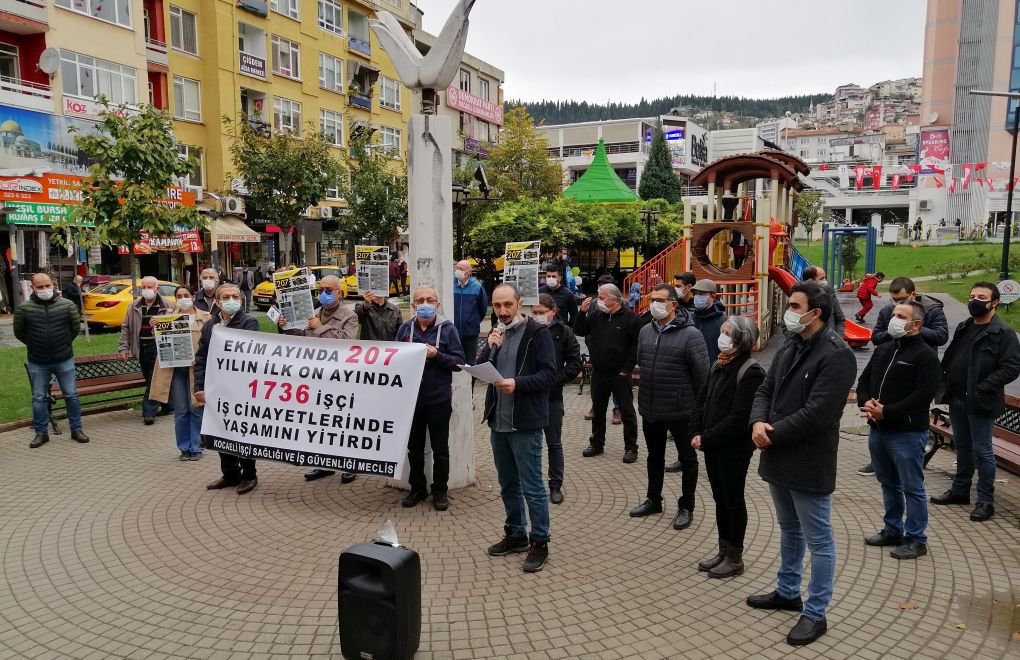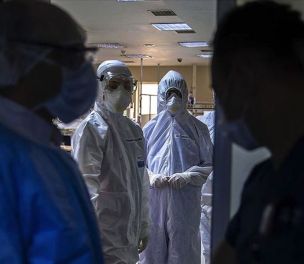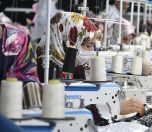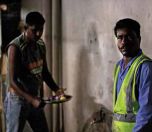HEALTH AND SAFETY LABOR WATCH
207 workers lost their lives in October

* Photo: İSİG
Click to read the article in Turkish
The Health and Safety Labor Watch (İSİG Assembly) shared its October report on occupational homicides at the Human Rights Park in Turkey's northwestern Kocaeli province on Saturday (November 7).
While the report was read out by İSİG Representative to Kocaeli province Selçuk Karstarlı, the banner opened by the organization read, "Resistance and solidarity keep one alive in the face of occupational homicides, outbreak, unemployment, hunger and precarious work."
Referring to the controversial omnibus bill currently debated at the Parliament, Karstarlı said that the bill was a significant attack on workers, which would consequently pave the way for the workers aged younger than 25 and older than 50 to work in precarious conditions.
According to the figures shared by Karstarlı, 1,734 workers lost their lives in Turkey in the first 10 months of 2020. At least 325 workers have died of the novel coronavirus (COVID-19) since March 11, 2020, when the first COVID-19 case was officially confirmed in the country.
Eight children, 14 women, 12 immigrants
While 207 workers lost their lives in October while working, the other highlights from the report are briefly as follows:
* Of the deceased workers, eight were children, 14 were women; 12 were immigrants, nine from Syria, one from Afghanistan, one from Uzbekistan and one from Turkmenistan; 10 workers were unionized.
* As for the most frequent causes of death, 51 workers lost their lives due to COVID-19, 36 workers died by being crushed/ trapped under debris, 35 workers died in car/ shuttle accidents, 18 workers fell from a high place, 13 workers died of an heart attack, 12 workers died of an electric shock, 12 workers died due to violence and seven drowned/ smothered.
* Sectors with the highest number of occupational homicides were construction (40 workers), agriculture (38 workers), healthcare (32 workers), trade/ bureau (13 workers), transportation (13 workers), metal (10 workers), municipal/ general affairs (eight workers), textile (seven workers), shipyard/ ship (six workers), mine (five workers) and energy (five workers).
* As for the provinces with the highest number of occupational homicides, they were mostly industrialized provinces: 21 workers lost their lives in İstanbul, 16 workers in İzmir, nine workers in Urfa, eight workers in Antalya, seven workers in Ankara, seven workers in Antep, seven workers in Kayseri and six workers in Aydın, Denizli, Diyarbakır, Muğla and Tekirdağ each.
Recommendations and demands
Selçuk Karstarlı also listed workers' demands, especially amid the COVID-19 pandemic. Among the demands expressed by Karstarlı was the official recognition of COVID-19 as an occupational disease for health workers and an occupational accident for other workers.
Calling on the authorities to take health and safety measures in all fields such as transportation, food and housing, he also noted that all workers with chronic diseases or over a certain age, public and private, should be put on administrative and/or paid leave due to the pandemic.
"Working hours shıuld be cut without making any cuts in wages," he said, adding that "workers should be tested for the virus free of charge and prevalently and production should be halted in workplaces where there was an increase in the number of cases."
Karstarlı also said that the working hours of the ones working from home should be arranged and their expenses for work must be met.
Occupational homicides in Kocaeli
Concluding his remarks, İSİG Assembly Kocaeli Representative Karstarlı also shared information about the occupational homicides in the city.
According to the figures shared by him, at least five workers died in Kocaeli in October and 70 workers died in the first 10 months of this year.
Underlining that the number of workers employed in risky jobs was higher than several other provinces in Turkey as Kocaeli was one of the most important industrial areas of the country, he said, "Necessary workers' health and safety measures are not taken in several workplaces and necessary inspections are not carried out in Kocaeli. For this reason, 4.35 percent of all occupational homicides take place in our province while its population accounts for 2.17 percent of the total population."
Raising concerns about the high number of chronically ill and old workers as well as the ones in risk groups in Kocaeli, Karstarlı said, "For this reason, it is necessary to swiftly take measures against the outbreak." (RT/SD)








